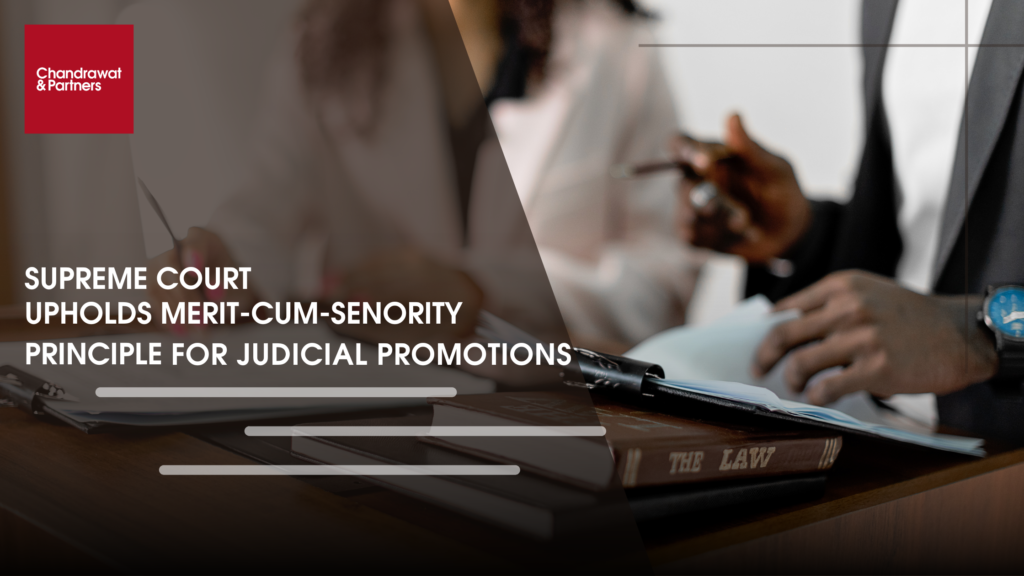
Share :
TRANSPARENCY AND FAIRNESS IN PROMOTIONS
In Ravikumar Dhansukhlal Maheta & Anr. v. High Court of Gujarat & Ors., the Supreme Court of India has upheld the recommendations made by the High Court of Gujarat for the promotion of Senior Civil Judges to the 65% promotion quota of District Judges based on the merit-cum-seniority principle. This decision has shed light on the long-standing debate surrounding promotion policies in government services, particularly in the judicial sphere, and the court’s role in ensuring fairness, transparency, and equality in such processes.
THE CASE BEFORE THE SUPREME COURT
The matter revolved around the writ petitions filed challenging the Select List, issued by the High Court of Gujarat for the promotion of Senior Civil Judges to the Cadre of District Judge (65% quota). The petitioners alleged that the Select List violated Article 14 of the Constitution of India, which enshrines the principle of equality, and Rule 5 of the Gujarat State Judicial Service Rules, 2005. Rule 5 mandates that the 65% recruitment to the District Judge cadre be done through promotions amongst Senior Civil Judges based on the principle of merit-cum-seniority and passing a suitability test.
THE COLONIAL GENESIS OF SENIORITY BASED PROMOTIONS
In this judgment, the Supreme Court examined the historical context of promotion policies, tracing their origins back to the era of British colonial rule in India. The Court noted that the East India Company initially promoted its officials solely based on the duration of their services, a principle known as seniority. This practice was officially recognized in the Charter Act of 1793 and continued until 1861. With the advent of the Indian Civil Service Act (ICS) in 1861, promotions were then based on a combination of seniority and merit, integrity, competence, and ability – a method that came to be known as ‘Seniority-cum-Merit.’
ABSENCE OF RIGHT TO PROMOTION UNDER INDIAN CONSTITUTION
The Court made a significant observation regarding the lack of an inherent right to promotion for government servants under the Constitution of India, 1949 (the “Constitution”). It stated that no government employee can claim promotion as a matter of right because the Constitution does not prescribe criteria for filling promotional posts. Instead, the Legislature or the executive has the authority to decide the method for filling vacancies in promotional posts based on the nature of employment and the functions the candidate will be expected to discharge. The Court’s intervention in promotion policies is limited to instances where the policy violates the principle of equal opportunity enshrined in Article 16 of the Constitution.
COURT’S OBSERVATIONS AND RECOMMENDATIONS
While upholding the Gujarat High Court’s recommendations, the Supreme Court suggested that the Gujarat High Court may amend its Rules on the aspect of the suitability test, making it more elaborate and comprehensive, similar to the Uttar Pradesh Higher Judicial Service Rules, 1975. The key recommendations included introducing a Viva Voce as an additional testing component, increasing the passing benchmark under existing components, considering the quality of judgments from the last two years instead of one, and incorporating seniority as a factor within the test scoring while finalizing the merit list.
BALANCING MERIT AND SENIORITY IN PROMOTIONS
The judgment highlights the need to strike a delicate balance between merit and seniority in promotion policies across government services. While seniority reflects loyalty, experience, and reduces the scope for favouritism, merit-based promotions ensure that the most competent and deserving candidates are selected for higher positions, thereby enhancing the efficiency and effectiveness of the organization. The Court recognized that the principle of seniority was derived from the belief that competence is inherently related to experience and that it limits the scope of discretion and favouritism in promotion decisions.
GUIDING LIGHT FOR PROMOTION POLICIES
The Supreme Court’s ruling has far-reaching implications for promotion policies not only in the judicial sphere but also in various other government services. It underscores the need for a fair, transparent, and objective process that upholds the principles of equal opportunity and merit while recognizing the value of seniority and experience. This judgment will serve as a guiding light for policymakers, judicial bodies, and administrative authorities in shaping promotion policies that strike the appropriate balance between these competing considerations.
Furthermore, the Court’s recommendation to incorporate more comprehensive and objective assessment criteria, can enhance the overall credibility and fairness of the promotion process. It also encourages government organizations to regularly review and update their promotion policies to align with evolving best practices and societal expectations.
A BALANCED APPROACH TO PROMOTIONS
The Supreme Court’s ruling in this case has provided much-needed clarity on the principles governing promotion policies in government services, particularly in the judicial domain. It emphasizes the need for a fair and transparent process that upholds the principles of equal opportunity and merit while recognizing the value of seniority and experience. By striking a judicious balance between these competing factors, promotion policies can foster an environment of meritocracy, loyalty, and organizational efficiency.
This judgment will undoubtedly have a far-reaching effect, prompting governments, judicial bodies, and administrative authorities across the country to re-examine their existing promotion policies and bring them in line with the principles laid down by the Supreme Court. Ultimately, the goal should be to create a system that rewards excellence, upholds fairness, and fosters an environment favourable to the professional growth and development of dedicated public servants, thereby enhancing the overall quality of governance and administration.
For more information or queries, please email us at
enquiries@chandrawatpartners.com



